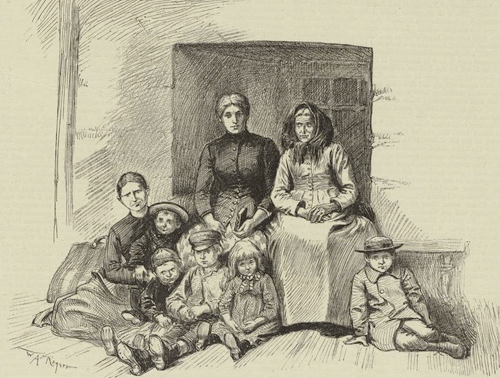William Henry Channing, today most remembered for "My Symphony" and, perhaps, his memoir of his Uncle William Ellery Channing, had a fascinating career which included, for a time, founding and editing a journal called "The Present." Undertaken while Channing was preaching in New York, "The Present" lived from 1843-1844. Of his qualifications for this work Channing said,
"This little Monthly, then, has quite liberal aims ; and it may justly be asked what are its editor's qualifications. With unaffected sincerity he confesses that he has none, other than the craving after a temper and spirit more in harmony with our privileges, a willingness to admit and abandon error and folly when exposed, independence, to some degree, from sectarian and party bonds, faith in the present inspiration and providence of God, hope growing ever stronger in the tendencies of the Age to universal good..."
This morning, part one of an article from the first number of "The Present" called,
SCENES FROM ACTUAL LIFE.—No. I. THE NORWEGIAN EMIGRANT. BY THE EDITOR.
Keen blew a northwest wind over the brown hills and through the valleys, where a line boat lay on the Erie canal, shut in by ice, one morning in November. A sleety rain had closed in snow on the previous day, followed by gusty breezes from the plains of Canada, and when the sun had set mid rolled up clouds of purple and gold with an orange green sky glittering behind, and stars flashing bright overhead, the boatmen had muffled themselves in their warmest coats, while the shivering boy whipped up his horses, anxious passengers clustered on deck, and the captain as he saw the ice fibres shoot over still spots of water, muttered, " 'tis our last trip this season." Midnight had settled calm over the leafless woods and white capped summits, and plains where the dry grass rustled ; ice had formed fast on the narrow line of the canal, and the crowded inmates of the boat had heard a crackling and hissing as she broke her way. An hour or two after there had been a call from the shore, the helmsman had summoned the captain, the half waked sleepers looking out of the doors and windows had seen the lamps gleam in long lines over the frozen surface, and all hands had turned in for a quiet nap ; the boat was fast.
And now it was morning. Welcome day, may be to the crew, who through the summer months had smothered in narrow bunks under their low roofed boat, sluggishly journeying to and fro over the same monotonous way, and who could now find change of labor in familiar places. Welcome day may be to the captain, sleeping late in dreams over his summer's gains and his winter speculations. But a most unwelcome day to the poor emigrants, who friendless, moneyless, houseless, without place in society or work before them, with no intelligible speech to make known their wants or ask their way, found themselves on the verge of winter about to be turned on shore amid the woods some half day's journey from . The hearts of those strangers were chill as they heard the summons of men made hard by familiarity with similar scenes of distress to leave the boat, which, uncomfortable as it was, still seemed to have some warmth of home. But leave the boat they plainly must. And a few hours saw them, men and boys on foot, women and children on trunks and bundles in country wagons, making their way to the next inland city. What lessons of a true order of society might this tendency of the poor to cluster in crowds teach us. Among them was Ulric, of Norway, with his wife, an infant born some three weeks before, and five older children. Poor Ulric! It needed a heart as brave and patient as thine, to be kind and gentle and thoughtful, that day, amidst thy multiplied anxieties..."
More on WHC in the next few days, and more of the story of Ulric...
Blessings
(illustration: Norwegian immigrants in New York)
Subscribe to:
Post Comments (Atom)

No comments:
Post a Comment